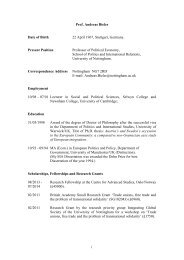Dr Gurnam Singh and Dr Stephen Cowden ... - Andreas Bieler
Dr Gurnam Singh and Dr Stephen Cowden ... - Andreas Bieler
Dr Gurnam Singh and Dr Stephen Cowden ... - Andreas Bieler
- No tags were found...
Create successful ePaper yourself
Turn your PDF publications into a flip-book with our unique Google optimized e-Paper software.
8 | P a g efollowing the introduction of university fees in the UK in 2004. Much of this extra income wasused to develop the business <strong>and</strong> commercial arms of universities, while the contact timewhich teaching staff had with student actually went down.In addition to this redistribution of resources away from teaching, we see an impoverishmentof the student learning experience where critical thinking, discovery <strong>and</strong> self efficacy is oftensubstituted for instrumentalist, st<strong>and</strong>ardised approaches that require universities to have goodprogression rates <strong>and</strong> degree classifications in order to maintain or even improve their positionin league tables. One consequence for students, as has been happening in schools for manyyears is that parents, teachers begin to collude to focus on results <strong>and</strong> nothing else. As Cannan<strong>and</strong> Shumar suggest, this can lead to a limiting of creative <strong>and</strong> critical capacitates <strong>and</strong>encouraging their “dulling down” (2009:7)An example of this is the modular system, which has been thrust upon HE ironically in order tocreate flexibility with <strong>and</strong> between institutions. Maggie Savin-Baden has noted that the maineffect of this is to ‘fragment <strong>and</strong> striate learning’ (2008:23). She goes on to lament emphasis ona performative curriculum design driven by the culture of learning objectives that tend toemphasise behavioural <strong>and</strong> measurable traits. This places the attention on what students areexpected to learn <strong>and</strong> likewise what lecturers are expected to assess. These devices so easilybecome like Sat-Nav systems, providing an easy formula for teaching <strong>and</strong> learning which closesdown the possibility of creative curriculum design, structures <strong>and</strong> spaces. In an approach wherecertainty becomes paramount, there appears to be little space for what Savin-Baden terms‘transitional spaces’ which are characterised by ambivalence, critical reflexivity, liminality, aswell as the idea of education as ‘troublesome knowledge’.By managerialising pedagogic practices, the sense of teaching as a craft is undermined <strong>and</strong>replaced by a series of st<strong>and</strong>ardised <strong>and</strong> ritualised pedagogic practices. And one manifestation,as Henry Giroux (1988) has noted is the way that a profound anti-intellectualism turns theclassroom into a place where students are passively trained for rote learned information – thesense that ideas could be interesting, exciting or transformative is entirely lost. Hence thelanguage of skills <strong>and</strong> competencies in the contemporary university is, far from the ideologicalneutrality it claims, about a process where creative independent thinking is severelydiscouraged, as crucial ideas <strong>and</strong> concepts are replaced with formulas. What is lost here is thecrucial idea that through encountering new ideas <strong>and</strong> concepts, that students could gain a newor a deeper underst<strong>and</strong>ing of their experiences.Critical PedagogyIn the chapter so far we have sought to highlight a series of problems associated with theimpact of neo-liberalism on the modern university. In concluding the chapter we now turn tothe tradition of Critical Pedagogy <strong>and</strong> what it may offer in responding to these challenges. Asconveners of the ’Critical Pedagogy <strong>and</strong> Popular Education Group’ we offer the followingprinciples that we have developed as a starting point:8 | P a g e



